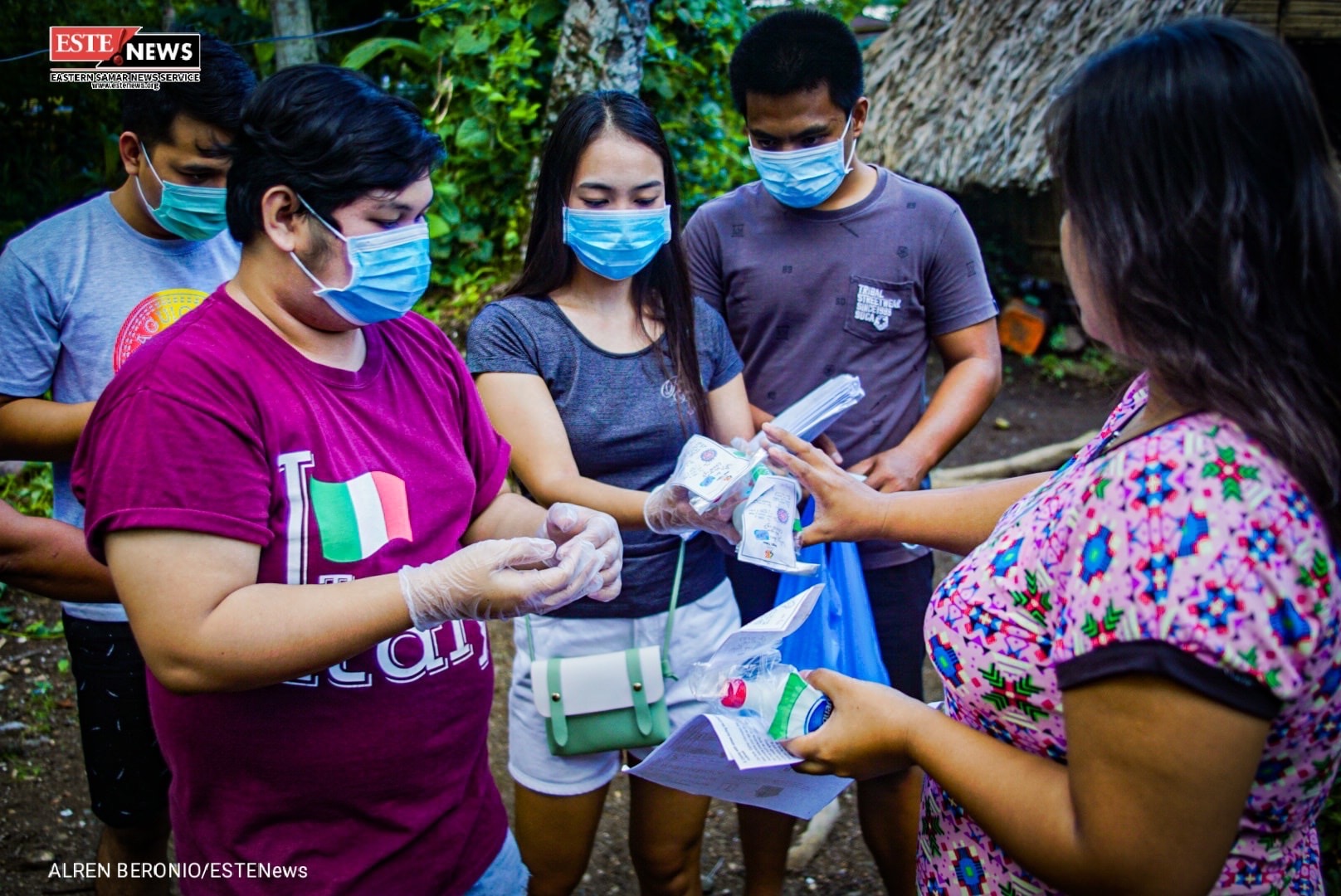By Felipe F. Salvosa II

Village officials distribute disinfection kits to residents of Barangay Taboc in Borongan, Eastern Samar last March 17. ALREN BERONIO/ESTE NEWS
The mayor of Jagna, Bohol is hesitant to place his town on lockdown mode.
“Lockdown, extreme social distancing, enhanced quarantine, whatever term you use it will cause panic,” said Joseph Rañola.
An expert on budget policy and local government finance, the first-time mayor has crunched the numbers.
Distributing food packs for some 33,000 residents, including three kilos of rice, will cost P1.2 million. The supplies will not last a week.
“Right now, I have only P9 million at my disposal. It’s not enough,” Rañola said.
Jagna, a third-class municipality, is so far free of coronavirus disease (Covid-19).
From as much as 380 persons under monitoring and three persons under investigation for possible infection, the numbers have dwindled to 13 and zero.
But Rañola said the outbreak of coronavirus disease (Covid-19) had caught local government executives off-guard.
“We’ve experienced the earthquake in Bohol. I’ve worked with Senator Panfilo Lacson on rehabilitation after Yolanda,” he said, referring to the powerful typhoon that lashed out at central Philippines in 2013.
“But this is a pandemic. No one is prepared for this,” he said.
Rañola pointed out that in the entire island province of Bohol, which has a population of 1.3 million, there are only about 300 beds for isolation. The province’s health care system will be overwhelmed if cases of infection spike, he said.
Unlike cities in Metro Manila close to central offices of national agencies, local government units (LGUs) in the provinces have severely limited resources even with quick-response and disaster funds under an emergency law rushed by Congress last week, he said.
“We’re not like Manila where Mayor Isko Moreno was once an undersecretary of social welfare … We are living in different worlds,” Rañola said.
READ: FULL TEXT: Bill granting extra powers to Duterte breezes through Congress
Prof. Ador Torneo, director of De La Salle University’s Jesse M. Robredo Institute of Governance, said the “vast majority of LGUs are not fully equipped” to implement all directives issued by President Rodrigo Duterte and the Interagency Task Force (IATF) for the Management of Infectious Diseases, which is spearheading the government’s Covid-19 response.
“Unfortunately, the national government passed most of the responsibilities in dealing with Covid-19 and the impacts of the enhanced community quarantine in the last few weeks. They’ve had to find ways to feed their people, isolate/quarantine and treat suspected cases, support the local hospitals, and shoulder the resources and logistics in implementing an enhanced community quarantine,” Torneo told PressOne.PH.
Earmarked calamity funds that LGUs can spend stand at just 5 percent of revenues from regular sources, he said, citing the Local Government Code of 1991.
“This is not much considering that many LGUs have limited funds,” he said. “Except for cities in NCR (National Capital Region) and some cities in major urban and industrial centers in Luzon, Visayas, and Mindanao, the vast majority of cities and almost all provinces and municipalities are dependent on the Internal Revenue Allotment from the national government.”
Torneo warned that many LGUs would run out of funds to feed residents if the quarantine is extended by another month.
“It is possible for all LGUs to mobilize resources to address immediate needs, but only a handful of them can sustain it for a prolonged period of time,” he said.
“Whatever the flexibilities provided by the national government are not enough unless they are complemented by actual resources.”
Torneo, together with volunteers from De La Salle University, have compiled and documented best practices of LGUs in dealing with the pandemic, and have drafted seven principles for improving community management and response to Covid-19.
These are:
- limiting all non-essential movement and quickly identifying and isolating suspected or confirmed cases;
- reducing public exposure through strict physical distancing and hygiene measures;
- eliminating policies that increase crowding and minimizing inspections, even talking, at checkpoints;
- increasing the capacity of healthcare facilities and providing quarantine or isolation facilities;
- maintaining uninterrupted flow of goods, personnel and services;
- supporting all frontliners by giving them equipment, services and resources; and
- prioritizing the welfare of highly vulnerable groups such as the elderly, the ill, persons with disabilities, the homeless, and the poor.
“They can only do their best with the cards they are dealt with,” Torneo said of LGUs.
“Institutional capacity and readiness, and leadership, however, are entirely within their control. How they manage the resources and deal with the constraints they have and their strategies will affect the outcomes of their efforts to deal with the situation,” he said. (PressONE.ph)